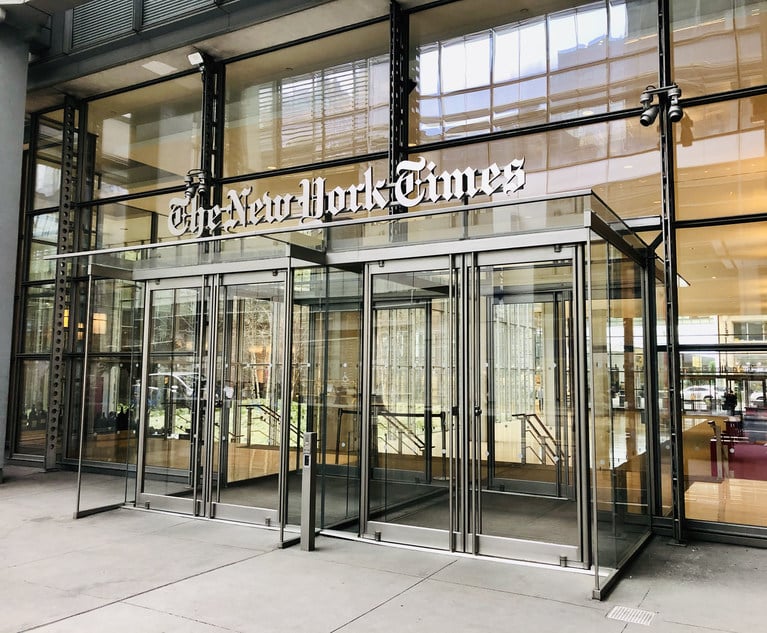 In-app purchase invoice for a Noom subscription plan
In-app purchase invoice for a Noom subscription planNoom 'Exploiting' Weight-Loss Customers Amid COVID-19, NY Federal Action Claims
A New York-based firm and its California client on Tuesday launched a proposed nationwide class action against Noom, claiming that the weight-loss "behemoth" has been bilking trial-period customers for years with a "renewal scheme" that "traps" them into "auto-recurring plans" that can cost up to $199.
May 13, 2020 at 12:11 PM
6 minute read
Targeting the weight-loss giant Noom for its alleged enrollment "renewal scheme" that "traps" trial customers into pricey "auto-recurring plans," a New York-based law firm and its California client on Tuesday launched a putative nationwide class action against the company in Manhattan federal court.
The lawsuit, which purports to represent both a multistate class and various state subclasses, including in New York and California, seeks at least $100 million from the app-based company, as well as punitive damages, injunctive relief, and other relief. The suit repeatedly contends, as laid out over 35 pages, that Noom for years has used a renewal scheme to "lure customers with deceptive promises of 'low cost' or 'zero cost' trial periods that turn out to be extraordinarily difficult to cancel and instead result in customers being trapped in costly auto-recurring plans" that can charge their credit cards up to $199 in a single shot.
And according to the Armonk, New York, law firm of Wittels McInturuff Palikovic that is helping to drive the action, the lawsuit is believed to be the first putative class action ever lodged against Noom alleging enrollment-based fraud.
Moreover, contends the Wittels firm and named plaintiff Geraldine Mahood, in recent weeks Noom has been especially aggressive in "exploiting" its growing base of customers during the trying and economically "disastrous" times of the coronavirus pandemic.
Noom "is seeking to exploit [the global pandemic] by now offering the trial period 'at zero cost' and capitalizing on the moment by promising potential customers that Noom will 'improv[e] [their] health' and 'help [them] find structure and relief during this difficult time,'" the complaint alleges, citing Noom's website for the quoted advertising language.
No counsel for Noom was listed as of Wednesday morning. An email to Noom seeking comment on Wednesday was not returned.
At the heart of the lawsuit, according to the Wittels firm and Mahood, is a Noom ad campaign that ropes in trial customers with false and misleading information, followed closely by an orchestrated failure to properly inform customers what they need to do to cancel. And then, says the lawsuit, comes an automatic, nonrefundable, multimonth charge to their accounts.
For example, argues the lawsuit, potential customers are led to believe via advertising that if they sign up for Noom, which counsels clients on what to eat and when in order to lose weight, they'll be able to work with a personalized human "coach."
But in reality, says the Wittels firm and Mahood, a former Noom customer from Chico, California, no human coach exists. Instead, an artificial intelligence-powered "bot" does, the suit states.
"Noom is well aware that its claims of personalized coaching are untrue," the lawsuit contends.
"Upon information and belief," the complaint continues, "when Noom first launched its diet program in 2011 it offered consumers the option to supplement its free artificial intelligence fitness tracker with paid sessions from a human coach. [But] in or around 2019, Noom discontinued the paid coaching supplement. Instead, Noom began advertising its entire program as if personalized human coaching were an integral part of its customizable diet and exercise program. But this … is just another come-on."
The suit claims that when customers do sign up for a 14-day trial period, they are led to believe, among other things, that they can cancel at any time, at no charge, by simply contacting their "coach." Yet often, says the lawsuit, those customers end up not knowing who their coach is or if they even have one.
"Defendant's automatic renewal program works as follows," the action states. "In exchange for customers' credit/debit card or PayPal account information, Noom gives customers the opportunity to 'try' its weight loss 'coaching' program for a purportedly 'risk free' two-week trial period that is either free or at a set low cost ranging from $1.00 to $18.37. … [Then] as soon as the trial period ends the Company … begins assessing non-refundable membership fees. The fees start with a lump-sum non-refundable advance payment for as many as six months at a time, at a cost as high as $199.00."
The proposed class action next alleges that "prior to activating the automatic enrollment," Noom never gets customers' "explicit consent to the automatic enrollment and fails to adequately disclose or actively misrepresents" key information customers need to know.
For example, those missing or misleading points include, according to the suit, "fail[ing] to disclose that the automatic renewal will be activated even if customers never access the service during the trial period, and even if they never download the Noom app; … [and] fail[ing] to disclose that customers will not be able to cancel their trial membership or even contact Noom for any other purpose via e-mail, mail, phone, fax or through its website."
Instead, canceling a trial membership, according to the suit, entails a "multi-step" process that involves the customer going to "a third party to end the subscription through the iTunes App Store (for iPhone users) or Google Play Store (for Android users)."
On Tuesday, Tiasha Palikovic of Wittels McInturff Palikovic, a boutique firm that regularly handles plaintiffs-side class action litigation, said in an email that "Noom is not only defrauding customers," it is "seeking to exploit the coronavirus pandemic by bombarding a now-captive audience with ceaseless ads and promising increased health in an effort to trick even more customers into costly multi-month memberships."
"A class action is the only way to level the legal playing field," added Palikovic, echoing the complaint, which itself argues that "because Noom's fraudulent charges are relatively small compared to the much higher cost a single customer would incur in trying to challenge Noom's conduct, it makes no financial sense for an individual customer to bring" a legal action such as the one filed Tuesday.
The suit brings six causes of action, including violation of New York state's consumer fraud statute under New York General Business Law §349 on behalf of the proposed multistate class; false advertising violation under the California Automatic Renewal Law on behalf of the proposed California state class; violation of the California unfair competition law on behalf of the California state class; and common-law fraud on behalf of the multistate class under New York state law or alternatively under individual state laws for state subclass plaintiffs.
The complaint, signed Tuesday by Steven Wittels of the Wittels firm, also alleges that Noom is "one of the fastest growing weight-loss programs in the world and has almost quadrupled its annual revenue to over $237 million in the past year."
This content has been archived. It is available through our partners, LexisNexis® and Bloomberg Law.
To view this content, please continue to their sites.
Not a Lexis Subscriber?
Subscribe Now
Not a Bloomberg Law Subscriber?
Subscribe Now
NOT FOR REPRINT
© 2025 ALM Global, LLC, All Rights Reserved. Request academic re-use from www.copyright.com. All other uses, submit a request to [email protected]. For more information visit Asset & Logo Licensing.
You Might Like
View All
‘Issue of First Impression’: New York Judge Clears Coinbase Appeal Amid Crypto Regulatory Clash
4 minute read
New York Times Moves for $100K in Attorney Fees Against Dfinity Foundation
3 minute read
Health Care Data Breach Class Actions Saw December Surge in NY Courts

Trending Stories
- 1Courts, Lawyers Press On With Business as SoCal Wildfires Rage
- 2Florida, a Political Epicenter, Is the Site of Brownstein Hyatt's 13th Office
- 3Law Firms Close Southern California Offices Amid Devastating Wildfires
- 4Lawsuit alleges racial and gender discrimination led to an Air Force contractor's death at California airfield
- 5Holland & Knight Picks Up 8 Private Wealth Lawyers in Los Angeles
Who Got The Work
Michael G. Bongiorno, Andrew Scott Dulberg and Elizabeth E. Driscoll from Wilmer Cutler Pickering Hale and Dorr have stepped in to represent Symbotic Inc., an A.I.-enabled technology platform that focuses on increasing supply chain efficiency, and other defendants in a pending shareholder derivative lawsuit. The case, filed Oct. 2 in Massachusetts District Court by the Brown Law Firm on behalf of Stephen Austen, accuses certain officers and directors of misleading investors in regard to Symbotic's potential for margin growth by failing to disclose that the company was not equipped to timely deploy its systems or manage expenses through project delays. The case, assigned to U.S. District Judge Nathaniel M. Gorton, is 1:24-cv-12522, Austen v. Cohen et al.
Who Got The Work
Edmund Polubinski and Marie Killmond of Davis Polk & Wardwell have entered appearances for data platform software development company MongoDB and other defendants in a pending shareholder derivative lawsuit. The action, filed Oct. 7 in New York Southern District Court by the Brown Law Firm, accuses the company's directors and/or officers of falsely expressing confidence in the company’s restructuring of its sales incentive plan and downplaying the severity of decreases in its upfront commitments. The case is 1:24-cv-07594, Roy v. Ittycheria et al.
Who Got The Work
Amy O. Bruchs and Kurt F. Ellison of Michael Best & Friedrich have entered appearances for Epic Systems Corp. in a pending employment discrimination lawsuit. The suit was filed Sept. 7 in Wisconsin Western District Court by Levine Eisberner LLC and Siri & Glimstad on behalf of a project manager who claims that he was wrongfully terminated after applying for a religious exemption to the defendant's COVID-19 vaccine mandate. The case, assigned to U.S. Magistrate Judge Anita Marie Boor, is 3:24-cv-00630, Secker, Nathan v. Epic Systems Corporation.
Who Got The Work
David X. Sullivan, Thomas J. Finn and Gregory A. Hall from McCarter & English have entered appearances for Sunrun Installation Services in a pending civil rights lawsuit. The complaint was filed Sept. 4 in Connecticut District Court by attorney Robert M. Berke on behalf of former employee George Edward Steins, who was arrested and charged with employing an unregistered home improvement salesperson. The complaint alleges that had Sunrun informed the Connecticut Department of Consumer Protection that the plaintiff's employment had ended in 2017 and that he no longer held Sunrun's home improvement contractor license, he would not have been hit with charges, which were dismissed in May 2024. The case, assigned to U.S. District Judge Jeffrey A. Meyer, is 3:24-cv-01423, Steins v. Sunrun, Inc. et al.
Who Got The Work
Greenberg Traurig shareholder Joshua L. Raskin has entered an appearance for boohoo.com UK Ltd. in a pending patent infringement lawsuit. The suit, filed Sept. 3 in Texas Eastern District Court by Rozier Hardt McDonough on behalf of Alto Dynamics, asserts five patents related to an online shopping platform. The case, assigned to U.S. District Judge Rodney Gilstrap, is 2:24-cv-00719, Alto Dynamics, LLC v. boohoo.com UK Limited.
Featured Firms
Law Offices of Gary Martin Hays & Associates, P.C.
(470) 294-1674
Law Offices of Mark E. Salomone
(857) 444-6468
Smith & Hassler
(713) 739-1250






